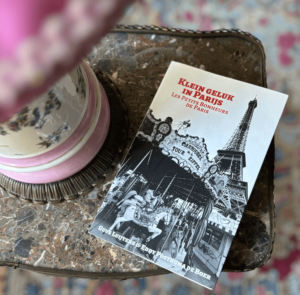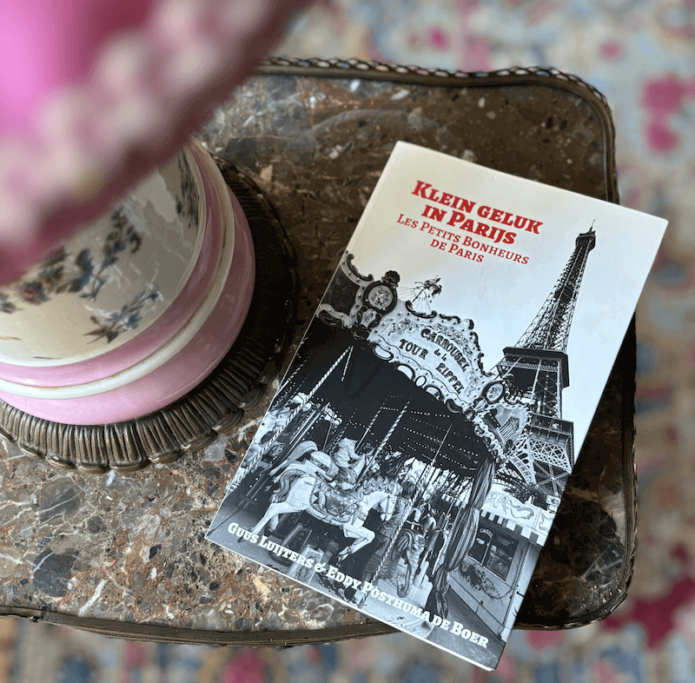Naar bed gaan met een hoofd vol Parijs — wie wil dat nu niet? Met Klein geluk in Parijs van schrijver, journalist en stadschroniqueur Guus Luijters kan het. Deze bundel herinneringen leest als een weemoedige ode aan de stad die hem zijn leven lang bleef betoveren.
Go to the English version of this article.
Morgen is altijd te laat
Guus Luijters (1943-2025) opent met een melancholische vaststelling: ‘Parijs blijft altijd hetzelfde, maar zodra we in [rue de] Ménilmontant aankomen, maak ik een rondje om te kijken wat er veranderd is. Iedere verandering is spijt.’
Waarom hij sommige winkels in deze straat nooit bezocht, zoals het lingeriezaakje op de hoek? Omdat hij dacht dat het ‘morgen ook nog wel kon’. Maar, schrijft hij: ‘Morgen is altijd te laat.’
Een leven lang Parijs
Toen hij dit boek samenstelde, wist Luijters waarschijnlijk al dat hij niet lang meer te leven had. Hij overleed in januari 2025. Klein geluk in Parijs werd daarmee een afscheidsbrief aan zijn geliefde stad.
Die liefde begon halverwege de jaren 50. Als elfjarige werd hij door zijn vader meegenomen naar Parijs — mopperend, want hij wilde na de vakantie gewoon naar huis. ‘Eenmaal aangekomen was het oorlog in onze Volkswagen.’ Maar wat begon als een kennismaking met tegenzin, groeide uit tot een levenslange fascinatie.
Weg van de toeristische plekken
De kronieken ademen die verwondering. Guus Luijters dwaalt door ‘zijn’ rue de Ménilmontant waar hij en zijn vrouw jarenlang een appartement huurden. Maar ook de rest van de stad komt voorbij — ver weg van de gebaande toeristenpaden.
‘Wij, kenners, dwalen liever door de Ménilmontant of het XII. Voor ons geen kitschschilders met artiestenbaretten. Ons vind je waar de Parijzenaars komen — en dat is níét op het Place du Tertre’, oftewel dé toeristenplek in Montmartre.
Maar dan komt hij tot de ontdekking dat dergelijke plekken zelden groter zijn dan een paar straten. En dan ineens staat hij wél in het deel van Montmartre waar ‘de tijd heeft stilgestaan’.
Foto’s vol sfeer
De teksten worden aangevuld met foto’s van zijn vriend Eddy Posthuma de Boer — bekend van zijn portretten van schrijvers en gewone mensen. Samen vormen ze een visueel en literair tweeluik.
Geen geromantiseerd Parijs
Is Klein geluk in Parijs een lofzang op de lichtstad? Ja — en nee. Want ook in de lichtstad gaat het wel eens mis. Zoals die keer dat zijn vrouw een taalfout maakt bij de Monoprix en de verkoopster Guus Luijters persoonlijk aanspreekt: vanaf nu wil ze alleen nog met hém praten.
Of die keer dat niet één, maar twee duiven achter elkaar precies boven zijn hoofd hun darmen ledigen. Twee jonge mannen proberen hem te waarschuwen – er zitten nog poepresten in zijn haar – maar hij is bang dat ze kwade bedoelingen hebben. En negeert hun opmerkingen.
De charme van het alledaagse
Het leven in Guus Luijters’ Parijs is nooit helemaal perfect. En juist dat maakt zijn kronieken zo charmant: het zijn verhalen van een mens in een stad — vol verwondering, ergernis, schoonheid en vergankelijk geluk. Het soort boek dat uitnodigt om er elke avond één hoofdstukje uit te lezen En dan fijn slapen.
Guus Luijters, Klein geluk in Parijs, De Kring, 2024, 19,99 euro
© Tekst en foto: Monsieur Plusfours 2025
MELD JE AAN VOOR ONZE GRATIS NIEUWSBRIEF Schrijf je in

Before Bedtime: A Chronicle from Small Joys in Paris by Guus Luijters
Going to bed with a head full of Paris—who wouldn’t want that? With Klein geluk in Parijs (Small Joys in Paris) by writer, journalist, and city chronicler Guus Luijters, it’s entirely possible. This collection of memories reads like a wistful ode to the city that enchanted him all his life.
Tomorrow Is Always Too Late
Guus Luijters (1943-2025) opens with a melancholy reflection: ‘Paris always stays the same, but as soon as we arrive in [rue de] Ménilmontant, I take a walk to see what’s changed. Every change is a regret.’
Why did he never visit some shops on that street, like the little lingerie store on the corner? Because he assumed, ‘I can always go tomorrow.’ But as he writes: ‘Tomorrow is always too late.’
Lifetime of Paris
When compiling this book, Luijters likely already knew his time was limited. He passed away in January 2025. Klein geluk in Parijs became a farewell letter to the city he so dearly loved.
That love began in the mid-1950s. At the age of eleven, he was taken to Paris by his father—reluctantly, since he just wanted to go home after their vacation. ‘When we arrived, it was war in our Volkswagen.’ But what began as a begrudging introduction blossomed into a lifelong fascination.
Off the Beaten Tourist Track
The chronicles breathe that sense of wonder. Luijters wanders through ‘his’ rue de Ménilmontant, where he and his wife rented an apartment for many years. But the rest of the city also makes an appearance—far from the well-worn tourist paths.
‘We, the insiders, prefer to roam around Ménilmontant or the 12th arrondissement. No kitschy painters with artist berets for us. You’ll find us where real Parisians go—and that’s not Place du Tertre,’ the iconic Montmartre tourist hotspot.
But then he realizes that such places are rarely more than a few streets wide. And suddenly, he finds himself in a part of Montmartre ‘where time has stood still.’
Photos Full of Atmosphere
The texts are complemented by photographs from his friend Eddy Posthuma de Boer—known for his portraits of writers and everyday people. Together, they form a visual and literary diptych.
Not a Romanticized Paris
Is Klein geluk in Parijs a love letter to the City of Light? Yes—and no. Because even in Paris, things go wrong. Like the time his wife made a grammar mistake at the Monoprix, prompting the shop assistant to address Guus Luijters directly: from now on, she would only speak with him.
Or the time not one, but two pigeons relieved themselves directly above his head. Two young men tried to warn him—there were still traces in his hair—but suspecting bad intentions, he ignored them completely.
The Charm of the Everyday
Life in Guus Luijters’ Paris is never picture-perfect. And that’s precisely what makes his chronicles so charming: these are the stories of a man in a city—filled with wonder, irritation, beauty, and fleeting joy. The kind of book you read one little chapter of each night. And then sleep, gently carried off by Paris.
Guus Luijters, Klein geluk in Parijs, De Kring, 2024, 19,99 euro
© Text and photo: Monsieur Plusfours 2025
